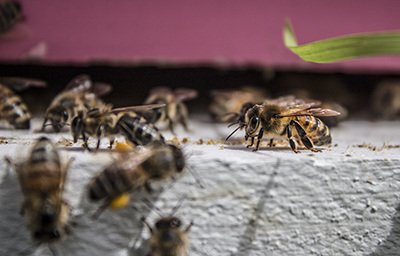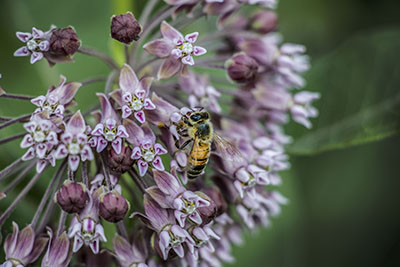Michigan Managed Pollinator Protection Plan listening sessions
Beekeepers, growers and others interested in the health of honey bees are invited to listening sessions to discuss pesticide use and bees.

Michigan State University will host six listening sessions around the state for stakeholders concerned about the health of managed bees in Michigan. These listening sessions will be held from late August to early October and will each be two hours. A short presentation will be followed by time for input. We invite local beekeepers, growers and others with interest in the long-term health of honey bees and other managed bees to attend one of these sessions to provide input.
These meetings and the input we receive will be an important step towards developing a Managed Pollinator Protection Plan that is underway currently. An inaugural meeting was held in February 2016 to bring together commodity partners and stakeholders to start discussing and developing a plan for managed pollinator protection and stewardship. These six listening sessions are the next step in the process that will culminate in producing a plan to help minimize risk of pesticides to our state’s managed bees and to ensure their long-term health.
The three main objectives of this process are to:
- Build relationships between interested parties in Michigan, representing beekeeper groups, growers, government and research to share existing work and to open pathways for future collaboration.
- Develop a managed pollinator protection plan that is consistent with the National EPA Pollinator Protection Plan that allows for adequate protection of managed and wild pollinator populations, while simultaneously maintaining the ability for agricultural producers to produce their crop.
- Develop a method and strategy of communication with the public and a wider group of stakeholders.

Honey bees at the entrance of a hive. A bee in the foreground can be seen with pollen baskets she is bringing back to the hive from a foraging trip.
The goal of the Managed Pollinator Protection Plan is to provide guidance to improve and protect the health of managed pollinators. It is designed to be flexible and is non-regulatory. With a high level of input from stakeholders, and with an open dialogue that promotes amendments and adjustments, the Michigan Managed Pollinator Protection Plan will be improved as we get more information.
Pollinator-related issues differ across states, so it is crucial to tailor Michigan’s Managed Pollinator Protection Plan to fit individual situations and encourage proper best management practices (BMPs) that apply best to our particular situation. Many other states have developed Managed Pollinator Protection Plans, and there is a list of these posted at the Pollinator Stewardship Network website. Guidelines for Managed Pollinator Protection Plans are found at the National Association of State Departments of Agriculture website.
Given the importance of beekeeping, crop production and wildlife habitat management in Michigan, we are inviting representatives from all of these sectors to the discussion. We expect this managed pollinator plan will highlight the many ways Michigan stakeholders can work together to ensure crop production and beekeeping remain strong in our state into the future. In order to tailor the plan to meet as many needs as possible, we are looking for input from stakeholders to move forward in developing a plan that will be productive, successful and beneficial.

Honey bee foraging on Asclepias, commonly known as milkweed.
Learn more about the Michigan Managed Pollinator Protection Plan, what the state of Michigan is doing to protect pollinators, and give us your feedback on developing the Managed Pollinator Protection Plan by attending one of the Managed Pollinator Protection Plan listening sessions listed below.
Scheduled listening sessions
- Aug. 30, 10 a.m.-12 p.m., Michigan State University Pavilion, 4301 Farm Lane, East Lansing, MI 48823, Room C/D
- Sept. 7, 10 a.m. -12 p.m., Saginaw Valley Research and Extension Center, 3775 S. Reese Road Frankenmuth, MI 48734
- Sept. 13, 2-4 p.m., Upper Peninsula Research and Extension Center, E3774 University Dr. Chatham, MI 49816
- Sept. 14, 10 a.m. -12 p.m., Northwest Michigan Horticulture Research Center, 6686 S. Center Highway Traverse City, MI 49684
- Oct. 4, 10 a.m. -12 p.m., Trevor Nichols Research Center, 6237 124th Avenue Fennville, MI 49408
- Oct. 6, 10 a.m. -12 p.m., Central Michigan University, 1200 S. Franklin St., Mount Pleasant, MI 48859
- Oct. 12, 10 a.m. -12 p.m., Tollgate Research Center, 28115 Meadowbrook Road, Novi, MI 48377
To register for any of these meetings so we can gauge attendance, please register at: Managed Pollinator Protection Plan Meetings. If you have any questions or concerns prior to the meetings, please let us know by emailing mmp3@msu.edu.
Find more information about the plan on our Managed Pollinator Protection Plan website. You can find updates and current information on listening sessions and other topics related to the Managed Pollinator Protection Plan on MSU Extension’s Pollinators and Pollination page.



 Print
Print Email
Email




